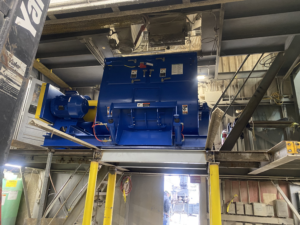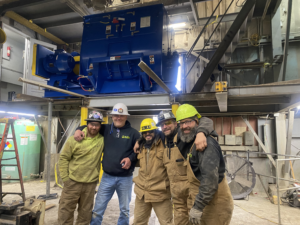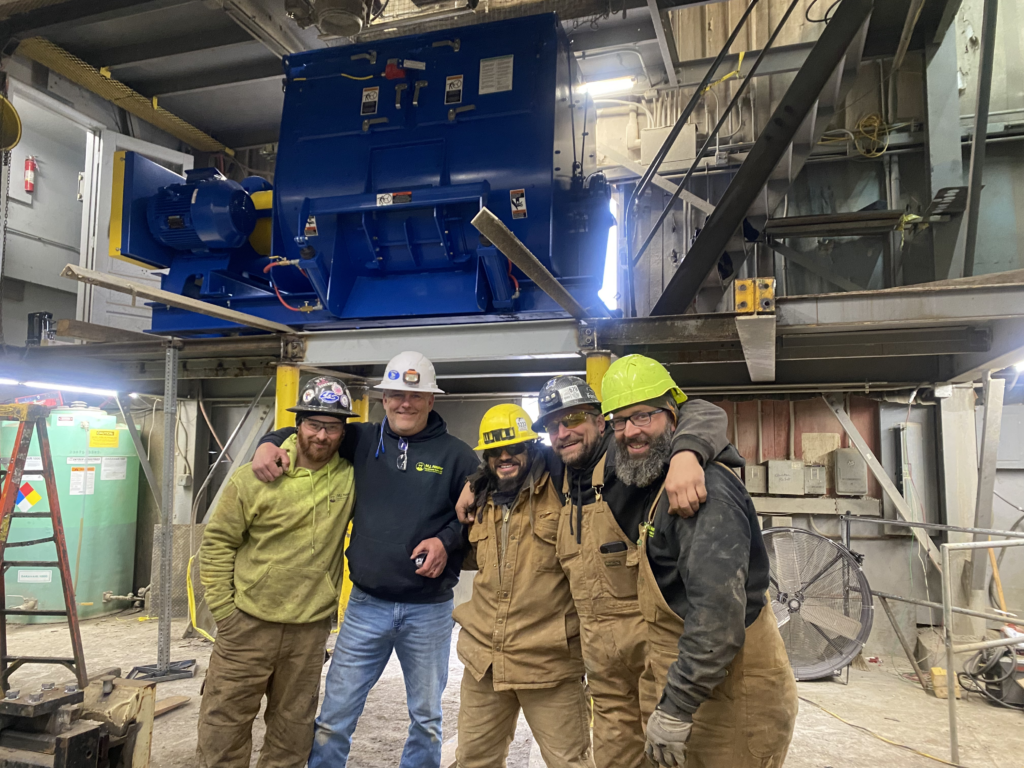Concrete is the foundation of many construction projects, from small residential homes to massive infrastructure projects. At the heart of every concrete mix lies a concrete mixer, the essential machine that ensures the right consistency, strength, and quality of the mix. Installing a concrete mixer properly is crucial to ensure that it functions efficiently, reliably, and safely.
What is a Concrete Mixer?
A concrete mixer is a machine used to combine ingredients—such as cement, water, and aggregates like sand or gravel—to produce concrete. The purpose of the mixer is to ensure that the ingredients are thoroughly mixed so that the concrete is uniform in texture and strength.
Types of Concrete Mixers
There are two main types of concrete mixers commonly used in the construction industry:
- Batch Mixers: Batch mixers are typically used for small- to medium-sized projects. They mix a batch of concrete at a time and are highly efficient for small construction sites where precise control over the mix is needed. Batch mixers come in various configurations, including drum-type and pan-type mixers.
- Continuous Mixers: Continuous mixers, on the other hand, are designed for large-scale production. These mixers allow for a constant flow of materials into the mixing drum, resulting in an uninterrupted production of concrete. Continuous mixers are often used in large construction projects or commercial settings.
M.J. Nester Equipment Sales: Expert Millwright Services for Concrete Mixer Installation
At M.J. Nester Equipment Sales, we understand that the installation process for a concrete mixer can be complex, and the precision of the setup is critical to ensure smooth operations. That’s why we offer expert millwrights who are equipped with the knowledge, tools, and experience to handle every aspect of the installation.
Whether you’re dealing with a small portable mixer or a large industrial-grade unit, our team will work diligently to ensure your concrete mixer is installed properly, safely, and efficiently. Our millwrights are trained to navigate even the most intricate installation processes and provide ongoing support to keep your equipment running at peak performance.
Common Uses of Concrete Mixers
Concrete mixers play a vital role in construction and infrastructure projects, and they have a wide variety of uses. Here are some of the most common applications:
- Commercial and Industrial Projects: In larger-scale projects, such as office buildings, shopping malls, or factories, concrete mixers are used to create large quantities of concrete efficiently. The ability to mix large volumes at once saves time and ensures a consistent product for use in walls, floors, and other structural elements.
- Road Construction: Concrete mixers are also used in road construction, where large volumes of concrete are required to build roads, bridges, and other infrastructure. The smooth and uniform mixing of concrete is necessary to create durable and long-lasting roadways.
- Precast Concrete Production: Concrete mixers are often used in the production of precast concrete elements, such as pipes, blocks, and panels. The controlled mixing process ensures that these products meet strict quality standards and are ready for use in construction.
Benefits of Using a Concrete Mixer
- Efficiency: Concrete mixers ensure quick and efficient mixing, reducing the time and effort it takes to prepare concrete.
- Consistency: A mixer guarantees uniformity in the concrete mixture, which is essential for creating durable and strong structures.
- Reduced Labor Costs: By automating the mixing process, concrete mixers reduce
Concrete is the foundation of many construction projects, from small residential homes to massive infrastructure projects. At the heart of every concrete mix lies a concrete mixer, the essential machine that ensures the right consistency, strength, and quality of the mix. Installing a concrete mixer properly is crucial to ensure that it functions efficiently, reliably, and safely.
What is a Concrete Mixer?

A concrete mixer is a machine used to combine ingredients—such as cement, water, and aggregates like sand or gravel—to produce concrete. The purpose of the mixer is to ensure that the ingredients are thoroughly mixed so that the concrete is uniform in texture and strength.
Types of Concrete Mixers
There are two main types of concrete mixers commonly used in the construction industry:
- Batch Mixers: Batch mixers are typically used for small- to medium-sized projects. They mix a batch of concrete at a time and are highly efficient for small construction sites where precise control over the mix is needed. Batch mixers come in various configurations, including drum-type and pan-type mixers.
- Continuous Mixers: Continuous mixers, on the other hand, are designed for large-scale production. These mixers allow for a constant flow of materials into the mixing drum, resulting in an uninterrupted production of concrete. Continuous mixers are often used in large construction projects or commercial settings.
M.J. Nester Equipment Sales: Expert Millwright Services for Concrete Mixer Installation
At M.J. Nester Equipment Sales, we understand that the installation process for a concrete mixer can be complex, and the precision of the setup is critical to ensure smooth operations. That’s why we offer expert millwrights who are equipped with the knowledge, tools, and experience to handle every aspect of the installation.
Whether you’re dealing with a small portable mixer or a large industrial-grade unit, our team will work diligently to ensure your concrete mixer is installed properly, safely, and efficiently. Our millwrights are trained to navigate even the most intricate installation processes and provide ongoing support to keep your equipment running at peak performance.
Common Uses of Concrete Mixers
Concrete mixers play a vital role in construction and infrastructure projects, and they have a wide variety of uses. Here are some of the most common applications:
- Commercial and Industrial Projects: In larger-scale projects, such as office buildings, shopping malls, or factories, concrete mixers are used to create large quantities of concrete efficiently. The ability to mix large volumes at once saves time and ensures a consistent product for use in walls, floors, and other structural elements.
- Road Construction: Concrete mixers are also used in road construction, where large volumes of concrete are required to build roads, bridges, and other infrastructure. The smooth and uniform mixing of concrete is necessary to create durable and long-lasting roadways.
- Precast Concrete Production: Concrete mixers are often used in the production of precast concrete elements, such as pipes, blocks, and panels. The controlled mixing process ensures that these products meet strict quality standards and are ready for use in construction.
Benefits of Using a Concrete Mixer
- Efficiency: Concrete mixers ensure quick and efficient mixing, reducing the time and effort it takes to prepare concrete.
- Consistency: A mixer guarantees uniformity in the concrete mixture, which is essential for creating durable and strong structures.
- Reduced Labor Costs: By automating the mixing process, concrete mixers reduce the need for manual labor, which can save both time and money.
- Versatility: Concrete mixers are versatile tools that can be used for a wide range of applications, from small DIY projects to large-scale commercial builds.
Conclusion
Installing and using a concrete mixer is an essential part of any construction project. Ensuring proper installation and understanding its use will make all the difference in the quality and efficiency of your work.
At M.J. Nester Equipment Sales, we’re here to support you throughout the process. With expert millwrights available to handle the installation, we make sure your concrete mixer is up and running without a hitch.
If you’re ready to start mixing, remember that safety and preparation are key to a smooth and successful installation process. Contact M.J. Nester Equipment Sales today to get the expert help you need! Happy building!
![]()
the need for manual labor, which can save both time and money.
- Versatility: Concrete mixers are versatile tools that can be used for a wide range of applications, from small DIY projects to large-scale commercial builds.
Conclusion
Installing and using a concrete mixer is an essential part of any construction project. Ensuring proper installation and understanding its use will make all the difference in the quality and efficiency of your work.
At M.J. Nester Equipment Sales, we’re here to support you throughout the process. With expert millwrights available to handle the installation, we make sure your concrete mixer is up and running without a hitch.
If you’re ready to start mixing, remember that safety and preparation are key to a smooth and successful installation process. Contact M.J. Nester Equipment Sales today to get the expert help you need! Happy building!

